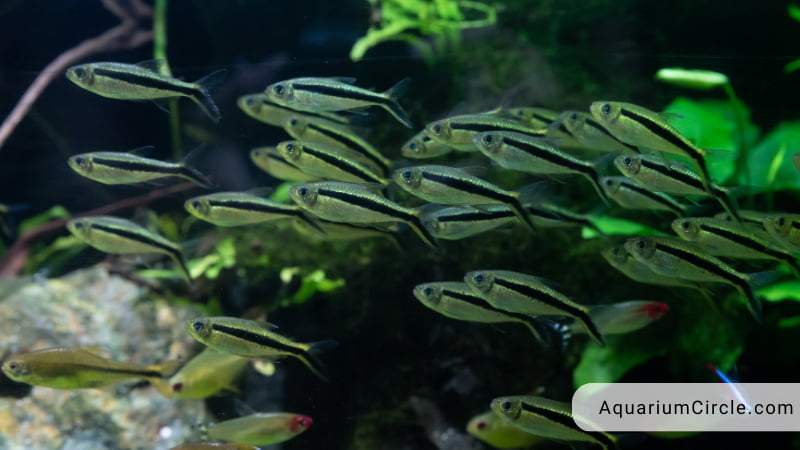Neon Tetra Lifespan is an important consideration for those who keep these popular fish as pets. While these small and colorful fish are known for their beauty and peaceful nature, understanding their lifespan is crucial for providing the proper care they need to thrive. In this blog post, we will explore the factors that affect neon tetra lifespan, tips for extending their lifespan, and common diseases that can impact their health and longevity.
See also:
- Everything You Need To Know About Yellow Neon Tetra Fish: Species Overview, Care, Q&a
- 5 Profesionals’ Tips On To How To Keep Neon Tetras Alive
- 9 Interesting Neon Tetra Fish Types For Your Aquarium
How Long Do Neon Tetra Live Exactly?
Neon tetras can live up to 8 years in their natural habitat, but in captivity, they typically have a lifespan of 5-7 years. However, with proper care and maintenance, some neon tetras have been known to live up to 10 years. There are many factors that can all play a role in the lifespan of neon tetras. Keep reading to find out what they are.
Factors Affecting Neon Tetra Lifespan
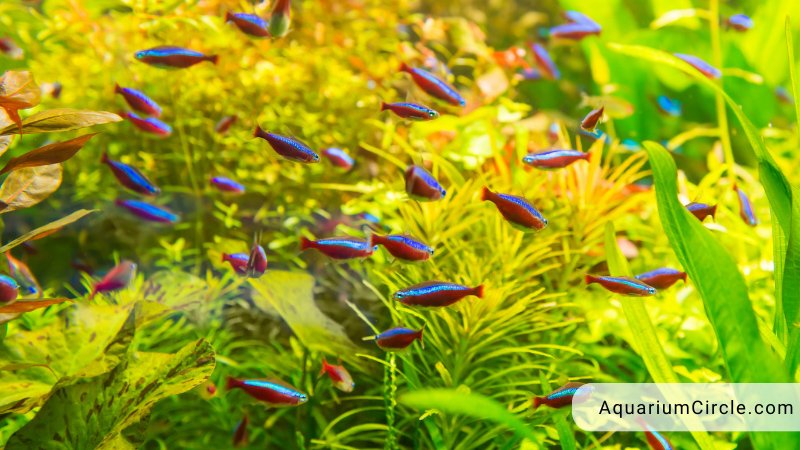
Several factors can affect the lifespan of neon tetras. Here are some of the key factors to keep in mind:
Water quality
Water quality is one of the most important factors affecting the lifespan of neon tetras. Neon tetras are very sensitive to changes in water chemistry and quality, so maintaining clean and healthy water conditions is crucial for their health and longevity.
High levels of ammonia, nitrite, and nitrate can cause stress and lead to health problems such as fin rot, ich, and other diseases, which can ultimately shorten the lifespan of neon tetras. It’s important to monitor the water parameters regularly and perform regular water changes to ensure optimal water quality.
Additionally, water temperature is also important for neon tetras. They require a stable water temperature between 72-78°F (22-26°C) to maintain good health. Rapid changes in water temperature can cause stress and weaken their immune system, making them more susceptible to diseases and ultimately shortening their lifespan.
Diet and nutrition
Diet and nutrition play a crucial role in the lifespan of neon tetras. Providing a balanced and varied diet is important for their overall health and well-being, which in turn can contribute to a longer lifespan.
A proper diet for neon tetras should include a mix of high-quality flake or pellet food and live or frozen foods such as bloodworms, brine shrimp, and daphnia. It’s important to avoid overfeeding as obesity can lead to health problems and ultimately shorten their lifespan.
A well-rounded diet rich in nutrients such as protein, vitamins, and minerals can help boost their immune system and prevent disease. A deficiency in certain nutrients can lead to health problems such as weakened immune system and stunted growth.
In addition to providing a balanced diet, it’s also important to feed neon tetras the appropriate amount of food. Overfeeding can lead to health problems such as obesity, digestive issues, and poor water quality.
Neon tetra tank size
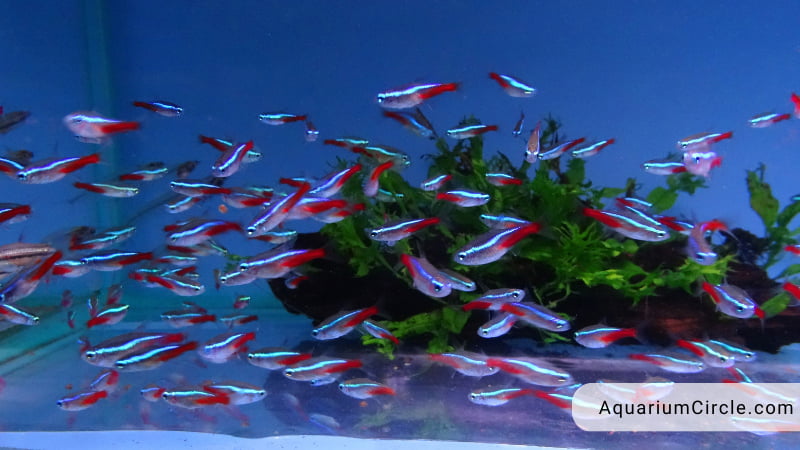
Tank size is another important factor that can affect the lifespan of neon tetras. Neon tetras are active fish that require ample space to swim and explore, and a small or cramped tank can lead to stress and health problems that can ultimately shorten their lifespan.
A general rule of thumb is to provide at least 1 gallon of water per inch of fish, but for neon tetras, it’s recommended to provide at least a 10-gallon tank for a small group of 6-8 fish. A larger tank can provide even more space and allow for a larger school of neon tetras.
A larger tank not only provides more swimming space but also allows for a more stable environment. A larger volume of water helps dilute waste and maintain stable water parameters, which can lead to better health and a longer lifespan for neon tetras.
In addition to providing adequate space, it’s also important to provide proper filtration and regular water changes to maintain optimal water quality. A well-maintained tank with ample space can promote good health and well-being for neon tetras and contribute to a longer lifespan.
Genetics
Genetics can play a role in the lifespan of neon tetras. Some neon tetras may be more prone to certain health problems and have a shorter lifespan due to genetics. Inbreeding and genetic defects can also affect the health and longevity of neon tetras.
It’s important to choose healthy neon tetras from reputable breeders to increase their chances of a longer lifespan. Healthy neon tetras should have bright and vibrant colors, active behavior, and no signs of disease or deformities.
Providing a healthy environment with proper care and maintenance can also help offset any genetic predispositions toward health problems. Regular water changes, proper nutrition, and avoiding stressors can all contribute to the overall health and well-being of neon tetras, regardless of their genetics.
Stress
Last but not least, stress is a significant factor that can affect the lifespan of neon tetras. Stress can be caused by a variety of factors such as overfeeding, aggressive tank mates, sudden changes in water parameters, and poor water quality.
Stress can weaken the immune system of neon tetras and make them more susceptible to diseases and infections. Chronic stress can lead to health problems such as fin rot, weakened immune system, and stunted growth, which can ultimately shorten their lifespan.
To reduce stress and promote a healthy environment for neon tetras, it’s important to provide a stable and comfortable habitat. This includes providing adequate space, proper water quality, and a suitable environment with hiding places and decorations.
Choosing compatible tank mates is also important in reducing stress levels. Neon tetras are peaceful fish and should be housed with other non-aggressive fish that have similar water requirements.
Avoiding sudden changes in water parameters and maintaining a stable water temperature can also help reduce stress levels for neon tetras.
What Can Shorten The Lifespan Of A Neon Tetra Fish?
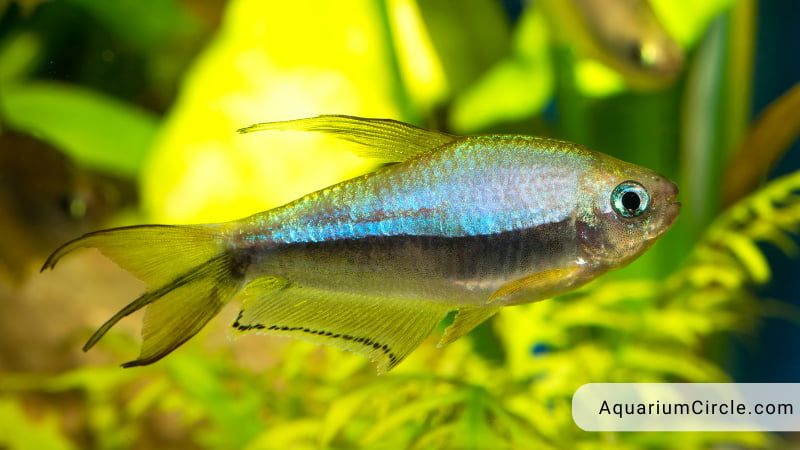
Overcrowding
Overcrowding can shorten the lifespan of neon tetras. Overcrowding can cause stress, aggression, and competition for resources such as food and hiding places. This can lead to weakened immune systems, increased susceptibility to diseases, and, ultimately a shorter lifespan.
Neon tetras are active fish that require ample space to swim and explore. A small or overcrowded fish tank can lead to stress and health problems that can affect their lifespan. Providing adequate space for neon tetras is crucial for their health and well-being.
See also: Q&a: How Many Neon Tetras In A 10 Gallon Tank? | Aquarium Stuff
Sudden Water Changes
Sudden water changes can potentially shorten the lifespan of neon tetras. Neon tetras are sensitive to changes in water chemistry and quality, and sudden changes can cause stress and even shock, which can weaken their immune system and make them more susceptible to diseases.
Aggressive Aquarium Mates
Neon tetras are peaceful fish that can become stressed and even injured if housed with aggressive tank mates. Aggression can cause physical harm to neon tetras, leading to open wounds that can become infected and ultimately shorten their lifespan.
It’s important to choose compatible tank mates for neon tetras, such as other small, peaceful fish that have similar water requirements. Avoiding aggressive and territorial fish can help reduce stress levels for neon tetras and promote a peaceful and healthy environment.
In addition to choosing compatible tank mates, providing adequate space and hiding places can also help reduce stress levels for neon tetras. Neon tetras are schooling fish and feel more comfortable in groups, so providing a school of 6-8 fish can help reduce stress levels and promote a healthy environment.
See also: Keep Neon Tetra With Goldfish: 5 Reasons Why You Shouldn’t
Bright Lights
While neon tetras require some light to maintain a normal circadian rhythm, too much bright light can cause stress and affect their behavior and health.
Exposure to bright light for extended periods of time can cause stress and lead to weakened immune systems, making them more susceptible to diseases and infections. It can also cause behavioral changes, such as decreased activity levels and decreased appetite.
Dirty Tank
A dirty fish tank can potentially shorten the lifespan of neon tetras. Poor water quality caused by a dirty tank can lead to health problems such as fin rot, ich, and other diseases, which can ultimately affect the lifespan of neon tetras.
Waste and uneaten food can accumulate in a dirty tank, leading to high levels of ammonia, nitrite, and nitrate, which can be toxic to fish. In addition, a dirty tank can promote the growth of harmful bacteria, parasites, and other organisms that can cause disease.
Neon Tetra Diseases That Affect Lifespan
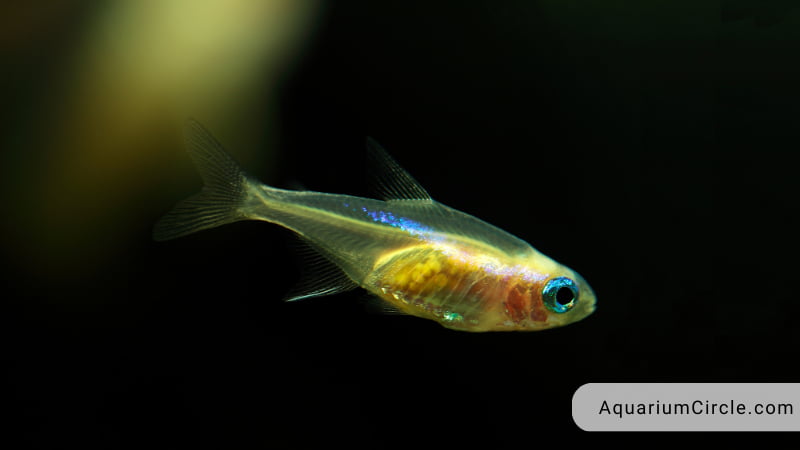
Neon tetras are susceptible to several diseases that can affect their lifespan. Here are some of the most common diseases that can affect neon tetras:
- Neon Tetra Disease (NTD): This disease is caused by a parasitic microorganism that can infect neon tetras, causing deformities, loss of color, and ultimately death. The disease is highly contagious and can spread rapidly through a tank.
- Ich: Ich or white spot disease is a parasitic disease that can cause white spots on the skin of neon tetras. The disease can cause stress, weaken the immune system, and make neon tetras more susceptible to other diseases.
- Fin Rot: Fin rot is a bacterial infection that can cause the fins of neon tetras to become ragged and deteriorate. The disease is often caused by poor water quality and can lead to stress, weakened immune system, and shortened lifespan.
- Dropsy: Dropsy is a bacterial infection that can cause the body of neon tetras to become swollen and bloated. The disease is often fatal and can lead to death within a few days.
- Velvet Disease: Velvet disease is a parasitic disease that can cause a velvet-like coating on the skin of neon tetras. The disease can cause stress, a weakened immune system, and, ultimately death.
Preventing diseases is crucial for maintaining the health and lifespan of neon tetras. Proper aquarium maintenance, regular water changes, and avoiding overfeeding can help prevent diseases by maintaining good water quality and reducing stress levels for the fish. Quarantining new fish before adding them to the main tank can also help prevent the spread of diseases.
See also: The 5 Characteristics Help You Know About Neon Tetra Disease Symptoms
Tips To Help Your Neon Tetra Live Longer In Your Aquarium
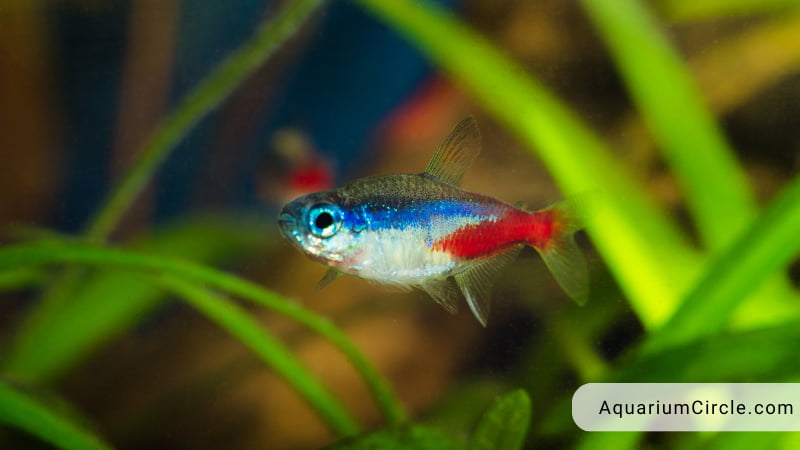
Here are some tips to help your neon tetra live longer in your aquarium:
- Provide a suitable environment: Neon tetras need a comfortable and spacious environment to thrive. Ensure that your tank is properly sized for the number of neon tetras you have, and provide hiding places and decorations to create a comfortable environment.
- Maintain good water quality: Poor water quality can lead to stress and diseases in neon tetras. Regular water changes and proper filtration are essential to maintain good water quality.
- Feed a balanced diet: A well-rounded diet rich in nutrients can help boost the immune system and prevent diseases. Feed your neon tetras a mix of high-quality flake or pellet food and live or frozen foods such as bloodworms, brine shrimp, and daphnia.
- Avoid overfeeding: Overfeeding can lead to health problems such as obesity, digestive issues, and poor water quality. Feed your neon tetras the appropriate amount of food, and avoid leaving uneaten food in the tank.
- Choose compatible tank mates: Neon tetras are peaceful fish that should be housed with other non-aggressive fish that have similar water requirements. Avoid aggressive and territorial fish that can cause stress and physical harm to your neon tetras.
- Monitor for diseases: Regularly monitor your neon tetras for signs of disease, such as changes in behavior, loss of appetite, or unusual spots or growths. Quarantine any sick fish and seek appropriate treatment to prevent the spread of disease.
By following these tips, you can help ensure that your neon tetras live a long and healthy life in your aquarium. Remember to provide a suitable environment, maintain good water quality, feed a balanced diet, choose compatible tank mates, and monitor for diseases regularly.
See also: Are Neon Tetras Aggressive? 5 Reasons For This Behavior
Video About Neon Tetra Lifespan
FAQs
What is the average lifespan of a neon tetra?
The average lifespan of a neon tetra in the wild is around 8 years, but in captivity, they typically live for 5-7 years.
Can neon tetras live with other fish?
Yes, neon tetras are generally peaceful and can live with other small, non-aggressive fish that have similar water requirements.
Can neon tetras survive in a planted tank?
Yes, neon tetras can thrive in a planted tank as long as the plants do not negatively affect the water quality and there is still plenty of swimming space.
How often should I feed my neon tetras?
Neon tetras should be fed small amounts of food 2-3 times per day. Overfeeding can lead to health problems and a shortened lifespan.
How can I extend the lifespan of my neon tetras?
You can extend the lifespan of your neon tetras by providing a healthy environment with clean water, a balanced diet, and proper tank maintenance. Avoiding stress is also important for their longevity.
References

Annette M. Chaney is an experienced marine biologist with over 20 years of experience as an aquarist and fishkeeper. She started her first aquarium at a young age, filling it with frogs and goldfish obtained from the ten-cent pet store.
Annette grew up caring for and breeding African Cichlids, which led to a hobby in high school that doubled as a profitable means. Attending Reed College gave her time to solidify herself as an accomplished aquarium caretaker with an eye for sales. After that, from 2009 – 2013, she studied at Roger Williams University – one of the most prestigious universities for Aquaculture and Aquarium in USA. She is the founder of AquariumCircle since 2010.
